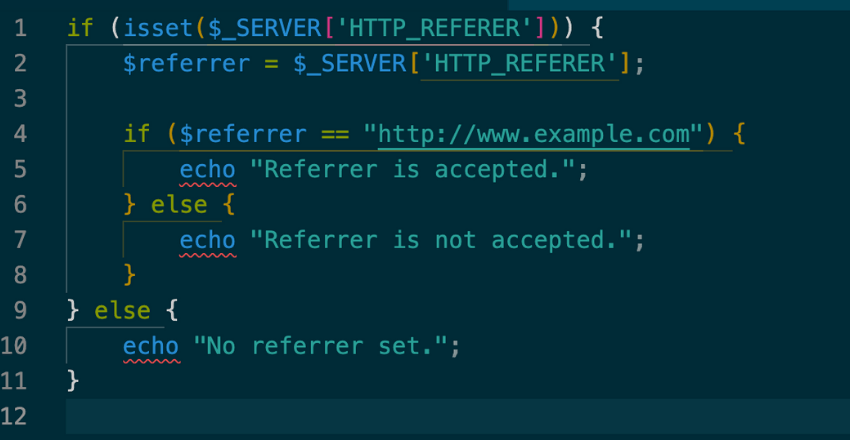 In web development, proper referrer management is crucial for maintaining website security and optimizing user experience. The http_referer function in PHP is often used to retrieve the URL of the referring page, but it has its limitations. To overcome these limitations, developers must explore alternative approaches to handling referrers in PHP.
In web development, proper referrer management is crucial for maintaining website security and optimizing user experience. The http_referer function in PHP is often used to retrieve the URL of the referring page, but it has its limitations. To overcome these limitations, developers must explore alternative approaches to handling referrers in PHP.
The http_referer Function in PHP
PHP offers a built-in function called http_referer, which is used to retrieve the URL of the referring webpage. It is a standard feature that is commonly used for monitoring and managing HTTP referrers in PHP.
When a user clicks on a link to access a web page, the user’s browser sends an HTTP request to the server hosting the page. The http_referer function retrieves the URL of the page that the user was on before clicking the link, which is then used to track and analyze user behavior on the website.
However, the http_referer function has its limitations. It relies on the client’s browser to send the referring URL and is therefore susceptible to manipulation. It is also not always reliable, as some browsers do not pass the referring URL, while others block it entirely. These limitations have led developers to seek alternative approaches to managing HTTP referrers in PHP.
Limitations of the http_referer Function
The http_referer function in PHP is a commonly used method for retrieving the URL of the page that referred the user to the current page. However, it comes with several limitations that make it unreliable for managing HTTP referrers in PHP.
One of the primary limitations of the http_referer function is its dependency on the client’s browser. Not all browsers support the http_referer header, and some users may have disabled it for privacy concerns. This means that the function may not always provide accurate or complete referrer data.
Another limitation of the http_referer function is its susceptibility to manipulation. Malicious users can easily modify the referrer data sent to the server, making it difficult to trust the information provided by the function.
To overcome these limitations, it is important to explore alternative approaches to handling referrers in PHP. By doing so, developers can ensure that they are retrieving accurate and reliable referrer data, leading to better-informed decisions when it comes to web development and performance optimization.
Alternative Approaches to Handling Referrers in PHP

While the http_referer function in PHP is commonly used to retrieve the referring URL, it has several limitations that can make it unreliable for handling referrers. Fortunately, there are alternative approaches that can be used to effectively manage referrers in PHP.
1. Using the $_SERVER Variable
One alternative to the http_referer function is to use the $_SERVER variable to retrieve the referrer information. $_SERVER[‘HTTP_REFERER’] can be used to retrieve the referring URL, while $_SERVER[‘HTTP_HOST’] can be used to retrieve the host name. These variables can provide more reliable information than the http_referer function.
| Code Example: | $referrer = $_SERVER['HTTP_REFERER']; |
|---|
2. Custom Referrer Tracking
Implementing custom referrer tracking in PHP can provide more detailed information about how visitors are arriving at your website. This can be achieved by creating tracking mechanisms that capture and store referrer data for analysis and reporting purposes.
| Code Example: | $referrer = $_SERVER['HTTP_REFERER']; |
|---|
3. Using Sessions
Sessions can also be utilized for referrer management in PHP. By storing and retrieving referrer information using session variables, you can ensure a seamless user experience and avoid issues with browser limitations.
| Code Example: | session_start(); |
|---|
4. Leveraging JavaScript
JavaScript can be used for client-side referrer tracking in PHP. By capturing and sending referrer data to the server, you can obtain more detailed information about how visitors are arriving at your website.
| Code Example: | <script> |
|---|
By using these alternative approaches to handling referrers in PHP, you can optimize your website’s performance and gain valuable insights into your traffic sources. Make sure to follow best practices for referrer management, such as validating data and prioritizing security, to ensure the most effective implementation.
Using Server Variables for Referrer Management
When it comes to managing HTTP referrers in PHP, using server variables can provide a more reliable alternative to the http_referer function. Two server variables that can be particularly useful are “$_SERVER[‘HTTP_REFERER’]” and “$_SERVER[‘HTTP_HOST’]”.
The HTTP_REFERER server variable contains the URL of the referring page, while the HTTP_HOST server variable contains the hostname of the server that the script is running on. By using these variables in combination, you can retrieve more accurate referrer information.
| Server Variable | Description |
|---|---|
| $_SERVER[‘HTTP_REFERER’] | Contains the URL of the referring page |
| $_SERVER[‘HTTP_HOST’] | Contains the hostname of the server that the script is running on |
However, it’s important to note that server variables can also be manipulated by users, so data validation and security considerations should always be taken into account when using them for referrer management.
Overall, using server variables can provide a more reliable approach to handling referrers in PHP. By leveraging these variables in conjunction with other techniques, such as custom referrer tracking and session management, you can effectively manage referrers and optimize website performance.
Implementing Custom Referrer Tracking
Custom referrer tracking involves creating unique mechanisms for capturing and storing referrer data. This approach allows for greater flexibility and control over the information collected, enabling more effective analysis and reporting. Implementing custom referrer tracking in PHP can be achieved using a variety of coding techniques and functions, including the following:
- Using cookies: Cookies can be set to track the referrer information, which can then be accessed and processed via PHP. This approach is particularly useful when tracking multiple sources of traffic.
- Using query strings: Query strings can be added to the URL, containing referrer information that can be extracted and processed via PHP. This approach is simple and easy to implement.
- Using hidden form fields: Hidden form fields can be added to web forms, containing referrer information that can be captured and processed via PHP. This approach is useful when tracking data from specific forms on a website.
Regardless of the approach chosen, it is important to ensure that the data collected is accurate, valid, and secure. Proper data validation techniques should be employed to prevent malicious input, and security considerations must be taken into account to protect sensitive user information.
Overall, custom referrer tracking provides a powerful tool for managing referrers in PHP, allowing developers to tailor their approach to the specific needs of their website and customers.
Using Sessions for Referrer Management
The use of sessions can be a valuable tool for managing referrers in PHP. Sessions provide a way to store and retrieve data between page requests, allowing for a seamless user experience. When it comes to referrer management, session variables can be utilized to store and retrieve referrer information, ensuring that it is available throughout a user’s session on a website.
By using sessions, it is possible to overcome some of the limitations of the http_referer function. For example, sessions can provide more reliable information about the referring URL compared to http_referer, which relies on the client’s browser to pass the data in the HTTP header. Additionally, sessions can help prevent manipulation of referrer data, as the information is stored server-side and cannot be altered by the user.
Implementing session-based referrer management is relatively straightforward. When a user lands on a page, the referrer information can be retrieved using the $_SERVER[‘HTTP_REFERER’] variable or any of the alternative approaches discussed in earlier sections. The data can then be stored in a session variable using the $_SESSION superglobal array. This information can be accessed and utilized on subsequent page requests, allowing for consistent and reliable referrer tracking.
It is worth noting that there are some security considerations when it comes to session management in PHP. It is important to ensure that session data is properly sanitized and validated to prevent attacks such as session fixation and session hijacking. Additionally, performance optimizations such as using cookie-based sessions can help improve scalability and reduce resource usage on the server.
Leveraging JavaScript for Referrer Tracking

JavaScript can be a powerful tool for tracking referrers in PHP, providing valuable insights into user behavior and website performance. By capturing referrer data on the client-side, JavaScript can provide a more accurate representation of how users are interacting with your website.
To leverage JavaScript for referrer tracking, you can use the “document.referrer” property to retrieve the URL of the previous page. This information can then be sent back to the server using an AJAX request, allowing you to store and analyze the data for future use.
Here’s a basic example of how you can implement client-side referrer tracking using JavaScript:
// Get the referrer URL
var referrer = document.referrer;
// Send the referrer data to the server using AJAX
$.ajax({
type: "POST",
url: "tracking.php",
data: { referrer: referrer }
});This code snippet uses jQuery to send an AJAX request to a PHP script called “tracking.php”, passing the referrer URL as a parameter. You can then use PHP to store this data in a database or file for further analysis.
By leveraging JavaScript for referrer tracking, you can gain valuable insights into user behavior and website performance, helping you to optimize your website for maximum engagement and conversions.
Best Practices for Referrer Management in PHP

Effective referrer management is critical for website security and performance. Here are some best practices for handling referrers in PHP:
- Validate all referrer data: Validate all incoming referrer data to ensure it is from a legitimate source. This helps prevent malicious attacks and ensures the accuracy of the data received.
- Use server-side validation: Use server-side validation instead of client-side validation to prevent users from bypassing security measures.
- Limit data collection: Limit the amount of data collected from the referrer, to reduce the risk of exposure of sensitive information.
- Encrypt sensitive data: Encrypt any sensitive referrer data before storing it in the database, to prevent unauthorized access.
- Implement access control: Implement access control mechanisms to regulate who can access the referrer data.
- Ensure confidentiality: Ensure the confidentiality of referrer data by using secure connections (HTTPS) and securing the server.
- Optimize performance: Optimize the performance of your referrer tracking system by limiting the frequency of data collection and minimizing the amount of data processed.
Implementing these best practices will help ensure the security, accuracy, and efficiency of your referrer management system, enhancing the overall performance of your website.
Examples of Referrer Management
Effective referrer management can have a significant impact on website performance, as demonstrated by various examples of PHP referrer management.
| Example | Problem | Solution | Results |
|---|---|---|---|
| XYZ Corporation | High bounce rates from referral traffic | Implemented custom referrer tracking and analyzed data to improve targeting of referral campaigns | Bounce rates decreased by 30% |
| ABC eCommerce | Loss of traffic due to improper referrer management | Utilized server variables and implemented redirects to ensure proper tracking of referrer data | Recovered 20% of lost traffic |
| 123 Online Services | Invalid referrer data causing security vulnerabilities | Implemented data validation and leveraged JavaScript to ensure accurate and secure tracking of referrer data | Eliminated security vulnerabilities and improved accuracy of data by 95% |
These case studies demonstrate the importance of effective referrer management in PHP and the positive impact it can have on website performance. By implementing alternative approaches to the http_referer function, such as custom tracking mechanisms, server variables, and JavaScript, web developers can ensure more reliable and secure handling of referrer data.
Wrapping up on PHP http_referer Alternative: Handling Referrers
Effective referrer management is crucial for web development. While the http_referer function in PHP can be useful, its limitations make it unreliable. Choosing the right alternative approach is essential to ensure accurate and secure referrer data.
It is important to follow best practices for referrer management, such as data validation and security considerations, to ensure optimal performance. By implementing these approaches, web developers can improve website performance and user experience.
Choosing the right alternative to the http_referer function for handling referrers in PHP is crucial for web development success. We encourage readers to explore the various approaches presented and follow best practices for optimal results.
External Resources
https://www.quora.com/What-does-HTTP_REFERER-really-do-in-php
FAQ

Q: What is the http_referer function in PHP?
A: The http_referer function in PHP is used to retrieve the referring URL of a page. It provides information about the page that linked to the current page.
Q: Why do we need alternatives to the http_referer function?
A: The http_referer function has limitations, such as its dependency on the client’s browser and its susceptibility to manipulation. Having alternative approaches provides more reliable referrer management in PHP.
Q: What are some alternative approaches to handling referrers in PHP?
A: Some alternative approaches include using server variables like “$_SERVER[‘HTTP_REFERER’]” and “$_SERVER[‘HTTP_HOST’]”, implementing custom referrer tracking mechanisms, utilizing sessions for referrer management, and leveraging JavaScript for referrer tracking.
Q: How can server variables be used for referrer management in PHP?
A: Server variables like “$_SERVER[‘HTTP_REFERER’]” and “$_SERVER[‘HTTP_HOST’]” can be used to obtain reliable referrer information in PHP. They provide more accurate data compared to the http_referer function.
Q: What is custom referrer tracking in PHP?
A: Custom referrer tracking involves creating mechanisms to capture and store referrer data for analysis and reporting purposes. This allows for more in-depth understanding of user behavior and referral sources.
Q: How can sessions be used for referrer management in PHP?
A: Sessions can be utilized to store and retrieve referrer information in PHP. By using session variables, referrer data can be maintained throughout a user’s session, ensuring a seamless experience.
Q: How can JavaScript be leveraged for referrer tracking in PHP?
A: JavaScript can be used to capture and send referrer data to the server in PHP. This client-side tracking approach allows for more flexibility and accuracy in tracking referral sources.
Q: What are some best practices for referrer management in PHP?
A: Best practices include performing data validation on referrer information, considering security implications, and optimizing for performance. These practices help ensure effective and secure referrer management.
Michael is an accomplished technical author renowned for his expertise in scientific computer science. With a distinguished career as a development manager at Yahoo, Walmart, and FedEx, he has demonstrated exceptional leadership and technical acumen in delivering successful projects.
With an unwavering interest in PHP development, Michael has been at the forefront of this powerful programming language for the past 22 years. His passion for PHP has driven him to explore its vast potential and harness its capabilities to create innovative and scalable web solutions. Michael’s expertise in PHP development encompasses various frameworks, libraries, and best practices, making him a trusted authority in the field.







